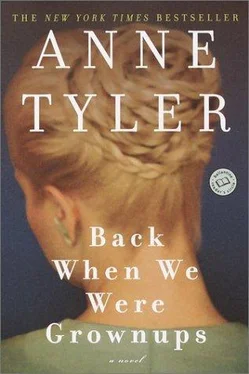“I won’t urge you to stay,” she said as she helped them into their things. “I know you want to be home before dark.” Already the light outside was dimming, she noticed. Both women placed soft, dry kisses on her cheek, and Aunt Ida said, “Thanks for a lovely party, darlin’.”
“Thank you for coming.”
“But I didn’t quite understand about the guest list,” her mother said.
“Sorry?”
“Who were some of those people? They seemed… beside the point.”
Ordinarily Rebecca would have been annoyed, but something about her mother’s wording struck her as comical, and so she merely laughed and said, “Drive safely.”
“We don’t want that Martin Luther King Boulevard,” she heard her mother tell her aunt as they walked toward the street. “Don’t want to get onto that ramp where the highways loop off like spaghetti…”
Other guests were stirring now. They were looking at their watches, sending meaningful glances toward the people they had come with. Oh, it always made Rebecca feel so bereft when a party hit that winding-down stage! The front parlor had a ragged look, with its empty chairs here and there and its scattered gift wrap. Instead of returning to her bench, she took a seat on the couch next to Peter. “Where’s he got to?” she whispered — meaning Poppy.
“Nap time,” he whispered back.
Nap time, and cool white sheets that warmed as they grew used to you. “It’s like you’ve made yourself a nest the exact same shape as your body,” Poppy was saying. “It’s this body-shape of warmth, and if you find you’re a little too warm, you just move your feet the least little bit and there’s this fresh new coolness.”
The person who kept replaying the videotape was Merrie; or at least Merrie was the person in front of the VCR at the moment, sitting tailor-fashion on the floor as close as she could get and studying one of the Christmases. Well, she was at that age, of course: seven. Still young enough to be interested in what kind of child her mother had been. In fact, Patch had been a downright homely child, as Rebecca recollected now that she watched her roller-skate across the screen. A spiky, knobby, wiry child, quarrelsome and thorny, not nurturing like Biddy or winsome like NoNo. But Patch was the first stepdaughter Rebecca had loved — or the first she’d become aware of loving. The night Patch’s appendix burst she had been so ill, in such visible pain, lying there so white-faced and enormous-eyed with every freckle standing out; and Rebecca had been struck by fear as physical as a kick in the stomach. In some ways, she had never recovered.
Not that this lessened her irritation in the slightest when Patch said, far too loudly, “What’s Poppy trying to do: set a world record?”
“Ssh,” Rebecca told her.
He must be nearing the finish line now; he was dressing for the party. (“… that crackly feel of starched shirtsleeves when you slither your arms inside them…”) And anyhow, Rebecca was enjoying this. It was sort of like a report on what it was like to be alive, she decided. Let’s say you had to report back to heaven at the end of your time on earth, tell them what your personal allotment of experience had been: wouldn’t it sound like Poppy’s speech? The smell of radiator dust on a winter morning, the taste of hot maple syrup…
Why, her own report might take even longer.
Zeb was wending his way toward her with that glass of champagne, finally. The jacks players were on their eightsies.
Peter was telling J.J.J. about scientists who made discoveries in their dreams. “And if you consider how many hours we spend dreaming,” he said, “figuring, say, two hours a night, which is the national average; and say we live eighty years, and… let’s see, two from ten, borrow the one… That would give me almost seven years of dreaming.”
Maybe it was his mention of dreams, or maybe the way he was sitting — next to her but turned slightly away, so that all she saw was his profile — but Rebecca just then had the strangest thought. She thought Peter was the boy she’d been traveling with on the train. She smiled at him, even though he wasn’t looking.
Poppy was describing the candles on his cake—”a wall of flame,” he called it — and the wish he’d made before he blew them out. “I wished for an even bigger party next year,” he said, “to celebrate my hundred and first. My palindromic birthday.”
Several people sent Rebecca looks of sympathy.
The jacks players had reached their ninesies. Zeb placed the glass of champagne in her hands and planted a kiss on the top of her head.
There were still so many happenings yet to be hoped for in her life.
“… and the icing was my favorite: fondant,” Poppy was saying. “It melted in my mouth. I held a bite in my mouth and it sat for just a second and then trickled, trickled down my throat, all that melting sweetness.”
On the screen, Rebecca’s face appeared, merry and open and sunlit, and she saw that she really had been having a wonderful time.
Anne Tyler was born in Minneapolis, Minnesota, in 1941 and grew up in Raleigh, North Carolina. She graduated at nineteen from Duke University, and went on to do graduate work in Russian studies at Columbia University. This is Anne Tyler’s fifteenth novel; her eleventh, Breathing Lessons, was awarded the Pulitzer Prize in 1988. She is a member of the American Academy of Arts and Letters. She lives in Baltimore, Maryland.












